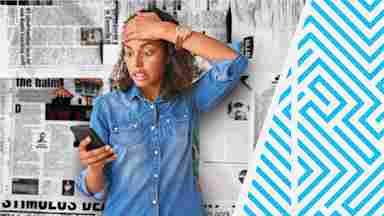- our decision-making – especially about important things – degrades
- our memory becomes less dependable, the more media sources we peruse
- our thinking becomes shallower – we have difficulty thinking what the information means at a more general level of application
- we have difficulty reflecting on the reliability of information we are ingesting
- increased levels of cortisol cause our anxiety and stress levels to rise
- Filter out 95 – 99% of the information that comes your way. Research shows smart people are effective blockers of the unimportant, irrelevant and misinformation. They develop skills to actively decipher what to ignore and block from the outset. Limit your intake of news to one or two times a day, restrain your tendency to continue to surf the web, unsubscribe, and turn off notifications on your devices.
- Focus deeply and broadly on one or two vetted sources of information on a topic of interest; zoom out beyond the concrete words and consider what principles you can glean from the content; identify aspects you are uncertain about or may disagree with; reflect on how reliable the source is, and focus on how this modifies your own perspective.



